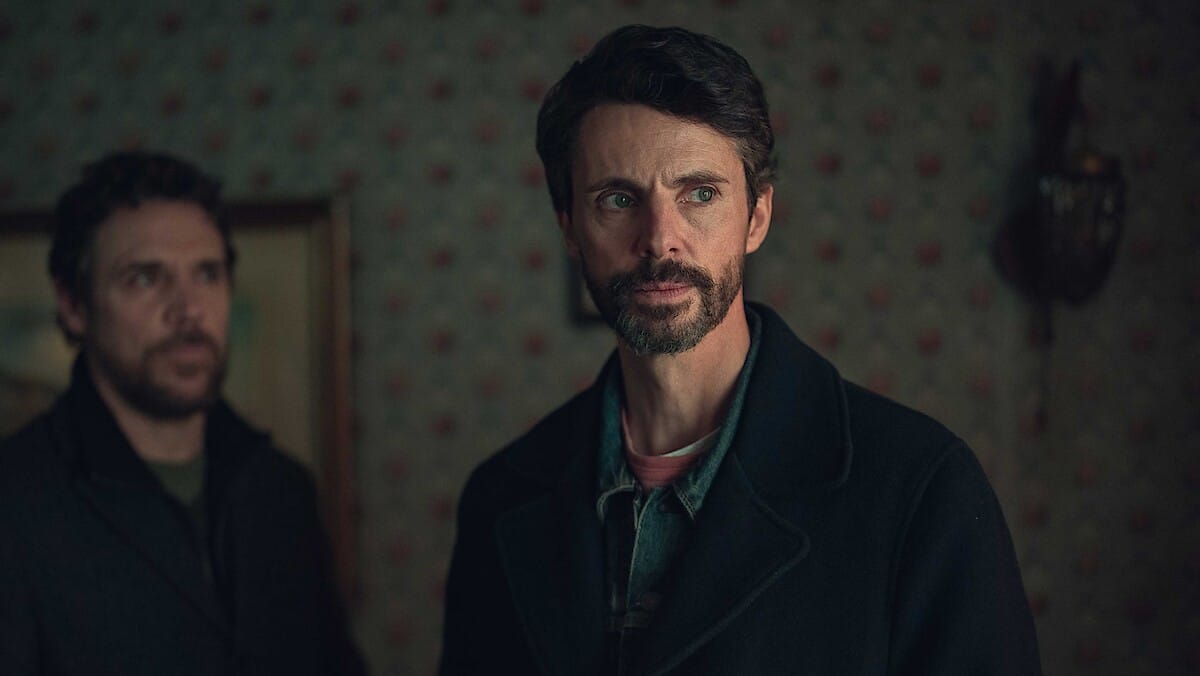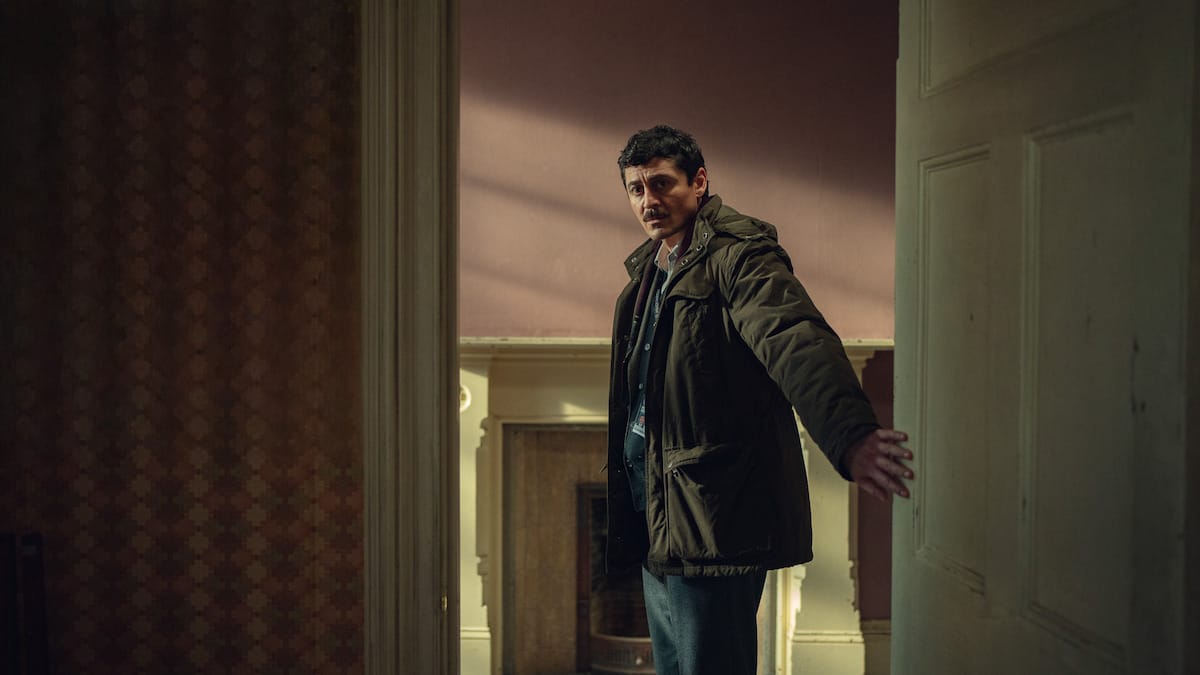"Dept. Q"'s Hot Take: "Be it conscience, karma or the universe, they are ultimately ...punished"

“Authority that does not exist for Liberty,” wrote the storied if controversial English historian Lord Acton, “is not authority but force.”
If you live in L.A.—in fact, if you live in Trump’s America and worry how we’ll ever rein in the administration’s harrowing campaign to shatter democracy—you will see where we’re going here. But, according to the boundary lines of a pop culture blog, one could quite fairly ask: what is Matthew Goode, in the persona of intriguingly surly Edinburgh murder cop Carl Morck, doing in the photo above?
Well, as elite as the craft of Netflix's hit "Dept. Q" may be, Morck at root he does what a homicide cop does. He seeks justice for those whose right to life and liberty has been ripped away. He goes at it with a self-judging anger, and perhaps there are broader lessons to be had in the situation the nation now finds itself.
There’s a signal public statement by a certain prosecutor in "Dept. Q" that does a lot of story work as well as stating a creed: “I firmly believe those who commit violent crime don’t ever get truly away with it; the court might set them free but be it conscience, karma or the universe, they are ultimately one way or another, punished.”
Words to protest by—maybe during this weekend of declaring, No Kings?
Enough of that for now. That worried look is how Morck rolls. Or rather, how he saunters. Turns out Morck also doesn’t much like authority from above and when presented with force, might even give you the beatdown. In the Scottish capital city, where he serves (he seems to have been transplanted from his native England as a result of a badly broken marriage-cum-divorce), Detective Chief Inspector Morck is tangentially reminiscent of Gillian Anderson’s forbiddingly elite homicide whisperer, Stella Gibson, on the BBC/RTF’s 2013 “The Fall.” Much as Superintendent Gibson went from London to Northern Ireland’s Belfast to be installed as the brilliant outsider working an especially thorny case, Morck is handed a cold case agenda where his near-legendary sleuthing chops can be deployed. Ah, but he complicatedly is living through a career and nerveous system repair after a fatal– perhaps incautious--day on the job. Gibson is tough, serrated, closed off—her instruction “fetch the boltcutters” epitomizes her work ethic (and served as inspiration and title to an especially raw Fiona Apple album in 2020.)
Edinburgh’s lightly trafficked streets and dun-colored Gothic architecture evoke a sort of urban placidity—a deceiving layer of normalcy and sea mist-slicked streets that can’t always contain the fierce, at times gangster-y emotional chaos underneath.
For all the charm of the burring local dialect—the advice from here is not to even start a drinking game involving toasts to the use of the modifier “wee”—there are plenty of ill-willed sorts and a near-overload of exceedingly nasty ones.
Morck can be such a skewering presence that even his dauntingly effective theorizing and interrogation skills are embodied in the epithet “prick”– which becomes almost an endearment as the show’s nine episodes play out. A second season is awaiting official notice, though between showrunner Scott Frank’s demonstrated prowess, the well-rooted foundation of several characters we’d happily follow into more murder-busting, and a well-stocked raft of extant source material, not to renew it would be a…lethal TV crime.
The said source material is a four-decade work by the premiere Danish crime writer Jussi Adler-Olsen, now 75. He embarked on crime writing at 37, arriving well after a childhood residing as the son of a therapist amidst the corridors and confines of his family’s lodging in three Danish mental hospitals. As he told Filmmaker years ago, “Living among mentally disabled people and the sometimes raving mad has of course had a great influence on my life and my writing.”
The Department Q-derived film that set the overall theme of “Keeper of Lost Causes” and three more Danish-made movies preceded the current series, which can be viewed on Fandango’s streaming site: https://athome.fandango.com/content/browse/details/The-KeepTo Adler-TK, er-of-Lost-Causes/785514?cmp=rt_where_to_watch,
Frank has long been an under-the-radar fixture in a smart but mainstream creative crowd that led him to projects--some more like dalliances–-with such figures as Spielberg (a partial credit on “Minority Report”), Michael Mann, and David Fincher.
As a journeyman of superior craftsmanship, he would end up nominated for taking on the script for Steven Soderbergh's “Out of Sight,” even though he jumped in to write it because he’d miscalculated his own financial heft. Finding himself with three kids and a Pasadena house costly beyond his means, “I panicked and I took the job,” he told Filmmaker, “for purely mercenary reasons .” He also got a nom for the screenplay for “Logan” in 2017, and stayed busy with streaming and screenplay gigs, but was still actively hoping to hatch a project with Adler-Olsen’s books . “There was just something Department Q [the books’ collective rubric] that ,stayed with me. And so I met with the author while I was shooting [the dark 2014 Liam Neeson psychological thriller] “A Walk Among Tombstones” ; I’d actually had the books for a couple of years by then.”
As happens almost as often as directors and show runners claim it does, the "Dept. Q" project ramped up with a leading man well in mind.
Frank had deployed Matthew Goode in his 2007 thriller “The Lookout”. As Goode told the Netflix chroniclers, Frank has surprised him by casting the Englishman as “a Kansas criminal bank robber, which I don’t really scream.“ But to Frank, Goode was ideal for showing the detective figure’s intensity that cloaked certain depths: “He would lend this undeniable intelligence with his flintiness, but that he could also be emotional without being sentimental.”
To Adler-Olsen, who had told Frank to rest assured the author would keep Frank’s option in play, it may have seemed a natural fit: “The societal pressures to make yourself indispensable are hard for most of us, but in the case of Carl Morck there is a dimension of self-hatred, too. He is full of shame following an incident at work where he nearly died and finds it hard to think about everything else.”
By the time Frank was enlisting Netflix in the project that would begin shooting last year, the showrunner had notched perhaps underrated small-screen fare like 2017’s “Godless” (with Jack O’Connell opposite Jeff Daniels). Frank then dazzled the streaming world with “Queen’s Gambit,” which owned the top spot on Netflix for a spell in 2020 and certified Anya Taylor Joy’s stardom with a Screen Actor’s Guild award for Outstanding Performance by a Female Actor in a Miniseries or Television Movie).
We’re barely two minutes into the opening of “Dept.Q” when the moment screenplay tutorials call an `inciting incident' punches a hole in our at-first idle observing of a lightly comic scene. What jumps up next shocks us, and will provide in flashbacks a palpable insight into Carl’s self-accusing bitterness. It's the sort of canny timeline engineering at which Frank is exceptionally gifted. And yet both the motive for and the perpetrator of the brutal shooting seem to be only a rather intriguing can kicked down the road—to Season 2, one can only speculate. The very investigative lesson Carl cites to a naïve rookie cop with the unsparing, “It’s not rocket science.” will one day need forensic attentions exploiting his own prowess.
Skipping a detailed synopsis which can only do injustice to the investigative steps Frank walks us through like a master hobbyist slipping a ship into a bottle, the crucial dramatic tick-tock involves trapping a key character in the loneliest of plights. (Being allusive here to avoid spoilers.)
Once launched—and maritime resonances abound in this tale of a port city not so unlike theooriginal author’s Copenhagen setting—we follow the intertwining fates of a fine array of characters:
Jamie Sieves’ James Hardy, who tends to go by his last and well-earned name, is at first the kind of boon detective partner any copper would want. Almost every one of his cast has cited Frank’ss avoidance of sentimentality, and the brusque repartee the two seasoned pros share fits that bill; but we also watch Hardy’s family interactions and what vet actor Sieves does with such scenes is unpretentiously deep and moving..
Kate Dickie as Morck’s boss (and comic foil )Moira is worth savoring; she’s an insult-slinger who makes us lean in for some glimpse of a more deeply, if covertly, caring person. Her snippy reply to the higher-ups bragging on their optics (“Can’t wait for the podcast”) is typical but especially tasty is a moment that wins a spot in the trailer. Fencing with Morck, she dashes a pricey ask, and one wonders, could any living thespian make more out of Moira’s syllabification of “The Price Is Right”?
Yes, the undersupported squad of struggling coppers is highly reminiscent of Gary Oldman’s Slough House cadre in “Slow Horses”, and indeed acerbic banter abounds in both moldy settings. But the overlap never weighs too heavily. We actually hope Morck will er, slough off the battered aubergine-hued Ford Sierra he pilots so randomly; but one can only hope his speed-parking practices, usually involving a curb hop but never aligning in the proper marked spaces, will continue.
Carl demonstrates that game recognizes game as he stalks the manipulative, not to say Machiavellian Mark Bonnar as played by Stephen Burns (from Brit TV’s “Guilt”). Carl vies with him, verbally backhands him, and ultimately outwits him, but Morck (and scenarist Frank, in another smart feat) grants him his own reasons for being how he is. Perhaps his quintessential line comes out of him when Morck inquires just what he, as a reformed yob now become the high and mighty Lord Advocate, is driving around in: “A fuck-you Ford.”
The privileged are cordially loathed throughout, and an evil rich bastard named Finch and even more evil public health powers step into frame to sell their niftily written characters without cliché. (A thug we’ll call an emissary from Finch takes a stab at brain-frying the also well-played Morck stepson Jasper, and. let’s just say the arrival of our shambling, hiking-booted anti-hero to defend Jasper plays out with a brutal and oddly exciting economy of gesture.)
Leah Byrne as Rose, the apprentice investigator who’s got her own near-crippling memories to fight off is someone we root for avidly, she’s that seemingly half-hapless intern type who somehow often figures out how to set things right.
Rose is the one who sees the inner strength and subterranean might of at-first-unlikely recruit Akram Salim. Withdrawn yet magnetic—quite a feat—he’s a former Syrian cop of mysterious expertise. Akram winds himself around the key cold case and stands out as one who can call Carl on his shit. ASsplayed by Kurdish-Russian-Swedish actor Alexej Manvelov, he can show a thug who his daddy really is, and yet, in a kind of Pedro Pascal-adjacent parlor trick, makes you want him as your patient, protective daddy.

Heroine honors for being given so much to do and doing it so very well go to Chloe Pirrie (The Queen's Gambit) as Merritt Lingard , the steely-on-the-surface prosecutor who has been missing for four years that we see in flashbacks and cutaways as her case becomes the investigators' sweaty nightmare. As she told Netlix’s Tudum chronicle, “What Scott, and the series, is so good at, that thing of crafting a story where you torture the characters in various ways, with their darkest secrets and fears.”
Finally, and maximizing her screen time in a way that makes us wish for more, is Kelly Macdonald as police therapist Dr. Rachel Irving, assigned to Carl after he was shot. Unforgettable in a number of roles since her debut in “Trainspotting” (1996), and the custodian of all our worst fears in “No Country for Old Men,” she is treated to the full tranche of Morck’s usually shielded charisma—then shakes it off with a fetching sangfroid, and supplies the moment of characterological recall that might be the moment that makes one so damnably fond of this show. Only her soul-probing insight can pierce the hard bark as she brings out a thread-capping moment that animates in Carl a lick of bluntly reflective pride: “I was a policeman today.”
You certainly were bud. Bring on Season 2.


Comments ()